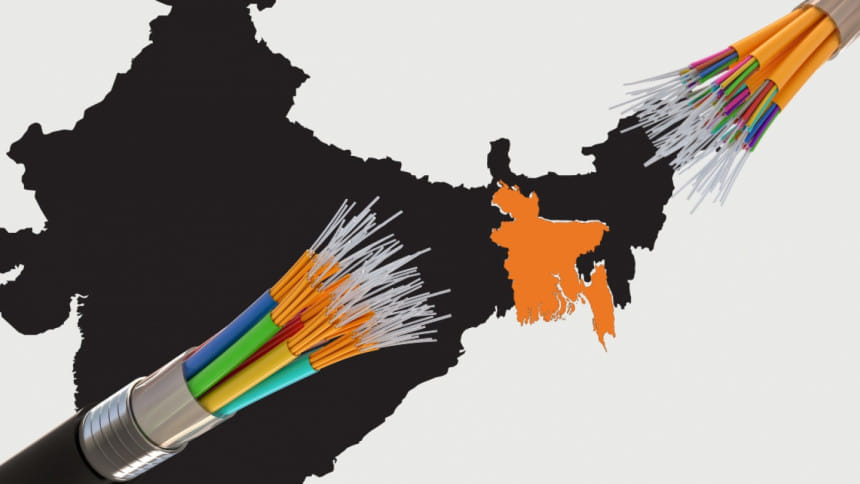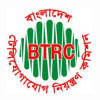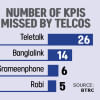The fallacious policy on exporting internet to India

The Bangladesh Telecommunication Regulatory Commission (BTRC) and Summit Communication Ltd are misguiding the government with multiple telecom transit proposals under the disguise of international internet bandwidth export to India, according to a report by The Daily Star. Once approved, this will forever strengthen India's grip on monopolising regional international internet bandwidth and wipe Bangladesh from its existing and prospective bandwidth export deals.
The BTRC is seeking the government's consent to Summit's proposal of bridging West Bengal with Tripura through a diagonal optical fibre cable (OFC) link across Bangladesh. This will unlawfully optimise the Indian telecom carriers' cost for speedier internet across northeast India. Consequently, Bangladesh will be made an expensive bandwidth supplier for Nepal and Bhutan due to additional right of way being payable to the Indian authorities.
Under this deal, Summit will also connect Bharti Airtel from India's Agartala with Singapore through the domestic OFC across Bangladesh. Then, the Indian carrier will illegally ride on the Bangladesh segments of state-owned undersea cables via state-owned landing stations at Cox's Bazar and Kuakata.
"It will enable faster internet services in the northeastern Indian states of Tripura, Arunachal Pradesh, Assam, Mizoram, Manipur, Meghalaya, and Nagaland," justifies BTRC, as per The Daily Star report.
Summit's managing director told The Daily Star that "it will be a good export opportunity if we could sell some bandwidth in the northeastern Indian states."
But the BTRC doesn't say what will happen to the state-owned Bangladesh Submarine Cable Company's existing export of bandwidth to the same destinations. According to The Daily Star report, the BTRC has pleaded to the Bangladesh government on behalf of Airtel, "At present, a distance of about 5,500 kilometres has to be covered to reach the landing station in Chennai from the northeastern part. However, due to the mountainous nature of the region, the maintenance of fiber optic networks and the installation of new networks is relatively difficult, meaning keeping the network secure is relatively a difficult task."
But the BTRC has concealed from the Bangladesh government that Power Grid India's telecom company, Powertel, operates a 47,735-kilometre OFC and 688 supply nodes across India. Moreover, the Indian government has sanctioned 7.16 billion rupees for OFC projects across the northeastern states in this year's budget. Therefore, the BTRC's doctrine of "relatively difficult" maintenance of fibre optic networks in the mountainous region of northeast India is a false statement with fictitious objectives.
The BTRC has also concealed from the Bangladesh government that, five years ago, Airtel contracted US vendor Ciena to install a 130,000-kilometre OFC network to connect more than 4,000 towns across India. Calling it "one of the World's Largest Photonic Control Plane networks in India," Airtel has claimed it also enables super-fast broadband experiences, making the most efficient use of available fibre resources. Simultaneous press releases from Airtel and Ciena in this regard strongly prove how wrong the BTRC and Summit are in terms of India's digital health.
Besides, the Indian carriers will pay nothing for using the right of way transit corridor to Bangladesh, because Dhaka and New Delhi have never even primarily discussed the technical, commercial, and political aspects of such a digital passage to India in the first place.
Meanwhile, Bhutan has already agreed to import a bandwidth capacity of 10 gigabits per second from Bangladesh's Akhaura border crossing two years ago. The OFC will enter Bhutan's Samdrup Jongkhar through Guwahati in India, according to the press reports in Bhutan and Bangladesh. Summit and the BTRC are now working hard to jeopardise this deal.
Nepal is also very keen to further diversify its international bandwidth supply via Bangladesh, as per a 2020 The Daily Star report. Earlier, Nepal linked its international internet with China, "ending India's decades-long monopoly of the Himalayan nation's cyber connectivity network," as reported by Reuters.
Officially, the Bangladesh government has done nothing whatsoever to expeditiously materialise the bandwidth export deals with Nepal and Bhutan. Unofficially, the Indian government's reluctance to give right of way to the landlocked neighbours remains the barrier to their connectivity.
Now, the BTRC has emerged in support of the vested groups to hijack the multi-government bandwidth trading export from littoral Bangladesh to landlocked Nepal and Bhutan, which will inevitably deprive Bangladesh from the great opportunities of becoming a regional internet bandwidth hub in South Asia.
Abu Saeed Khan is senior policy fellow at LIRNEasia.
Views expressed in this article are the author's own.
Follow The Daily Star Opinion on Facebook for the latest opinions, commentaries and analyses by experts and professionals. To contribute your article or letter to The Daily Star Opinion, see our guidelines for submission.

 For all latest news, follow The Daily Star's Google News channel.
For all latest news, follow The Daily Star's Google News channel. 











Comments